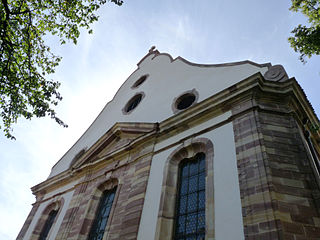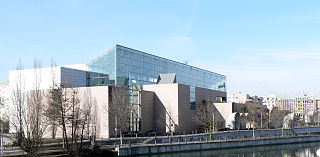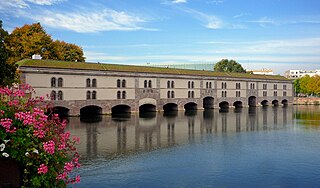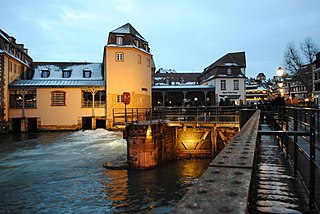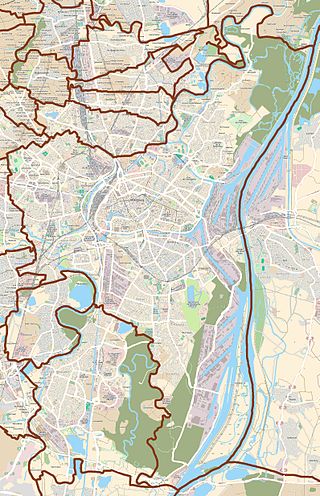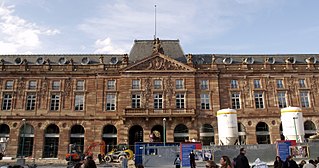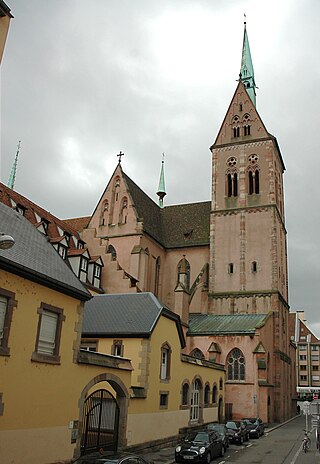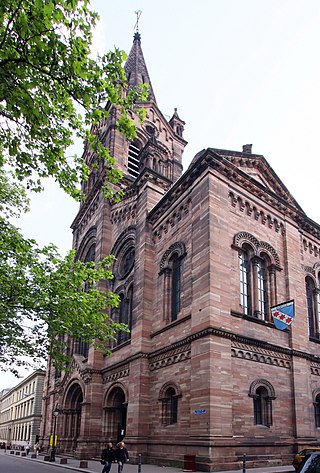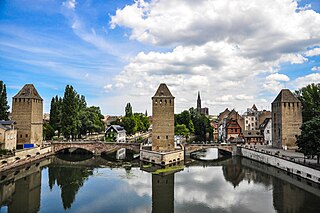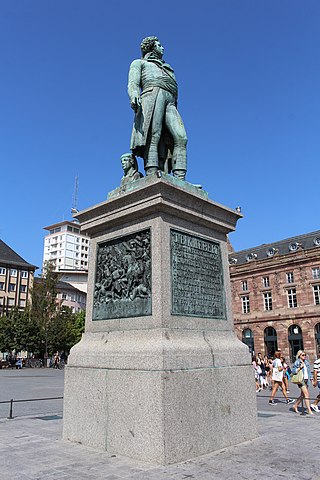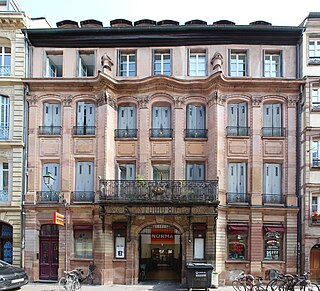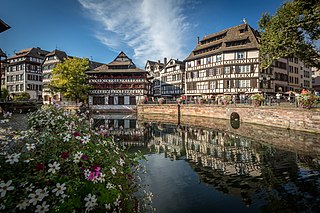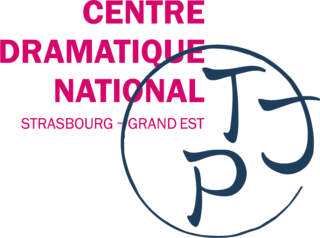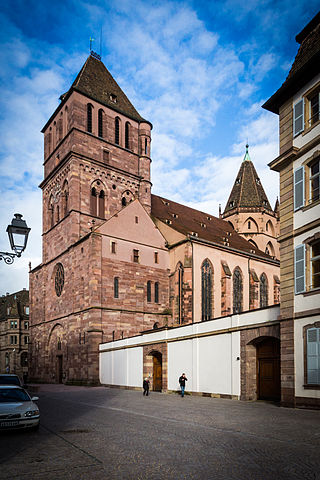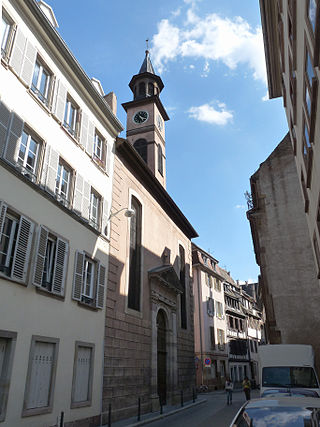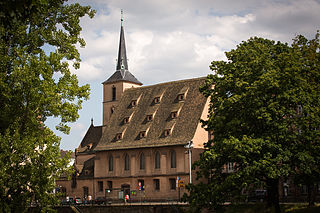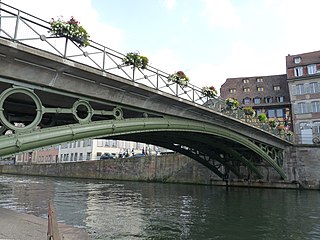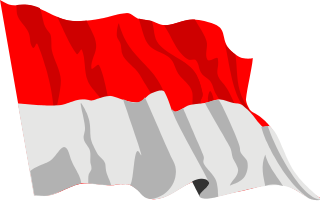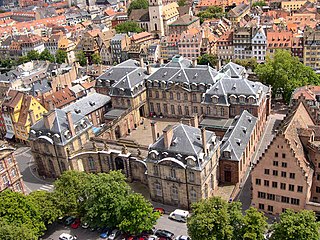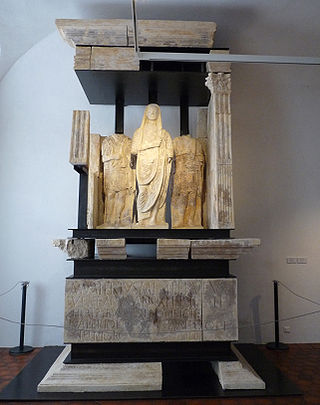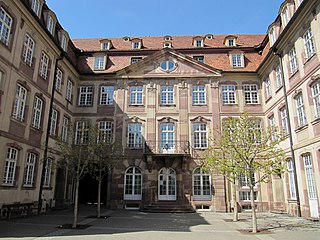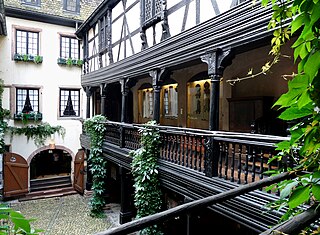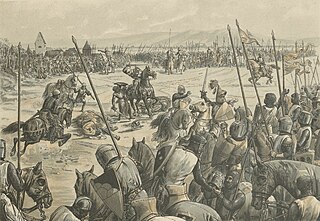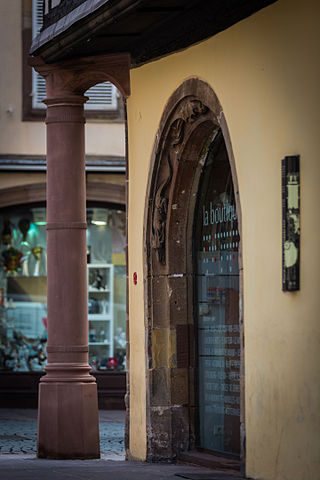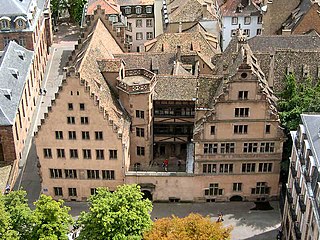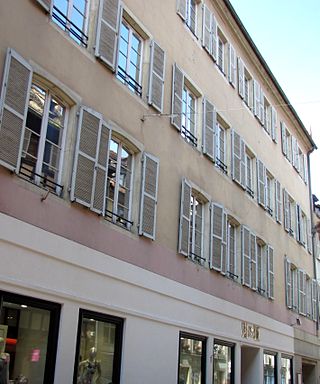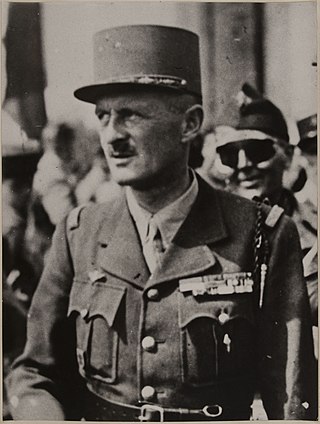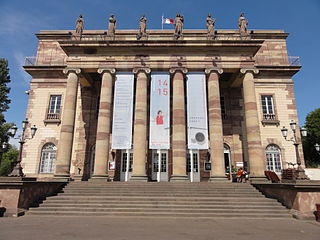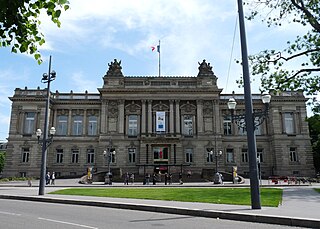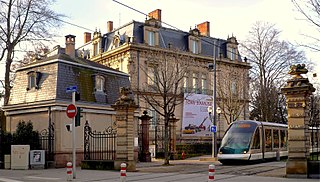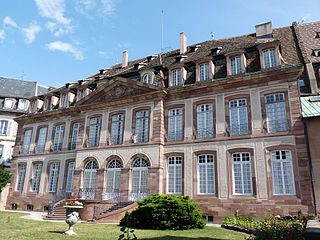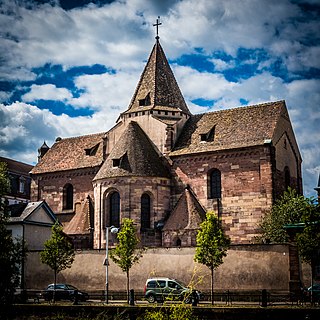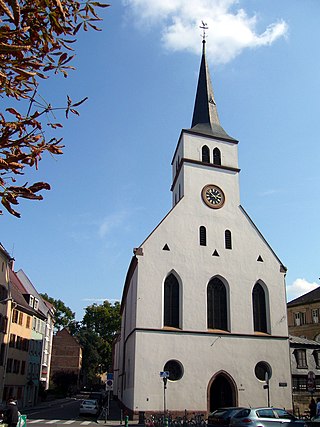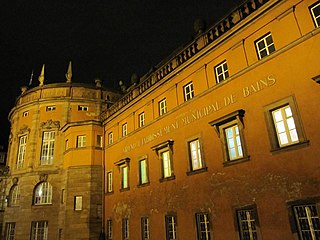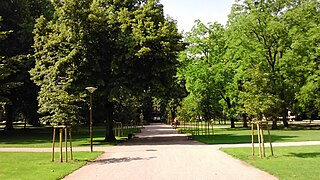Self-guided Sightseeing Tour #1 in Strasbourg, France
Legend
Guided Free Walking Tours
Book free guided walking tours in Strasbourg.
Guided Sightseeing Tours
Book guided sightseeing tours and activities in Strasbourg.
Tour Facts
10.4 km
193 m
Experience Strasbourg in France in a whole new way with our free self-guided sightseeing tour. This site not only offers you practical information and insider tips, but also a rich variety of activities and sights you shouldn't miss. Whether you love art and culture, want to explore historical sites or simply want to experience the vibrant atmosphere of a lively city - you'll find everything you need for your personal adventure here.
Activities in StrasbourgIndividual Sights in StrasbourgSight 1: Église protestante Sainte-Aurélie
The Church of Saint Aurelia, situated in the west of Strasbourg near the railway station, is one of the Strasbourg churches with the longest history. A Lutheran church since the Reformation, the church is of particular historical and architectural interest.
Sight 2: Musée d'Art Moderne et Contemporain
The Museum of Modern and Contemporary Art of Strasbourg (MAMCS) was inaugurated by Catherine Trautmann, then Minister of Culture and former mayor of Strasbourg, in December 1998. It was built by the architect Adrien Fainsilber on the left bank of the Ill, opposite the headquarters of the European Collectivity of Alsace and near the Vauban dam and the picturesque district of Petite France. The Place Jean-Arp, on which the museum opens, also houses the northern part of the National Institute of Public Service, located in the former Saint-Jean commandery.
Wikipedia: Musée d'art moderne et contemporain (Strasbourg) (FR), Website
Sight 3: Vauban Dam
The Barrage Vauban, or Vauban Dam, is a bridge, weir and defensive work erected in the 17th century on the River Ill in the city of Strasbourg in France. At that time, it was known as the Great Lock, although it does not function as a navigation lock in the modern sense of the word. Today it serves to display sculptures and has a viewing terrace on its roof, with views of the earlier Ponts Couverts bridges and Petite France quarter. It has been classified as a Monument historique since 1971.
Sight 4: Ponts Couverts
The Ponts Couverts are a set of three bridges and four towers that make up a defensive work erected in the 13th century on the River Ill in the city of Strasbourg in France. The three bridges cross the four river channels of the River Ill that flow through Strasbourg's historic Petite France quarter. The Ponts Couverts have been classified as a Monument historique since 1928.
Sight 5: Anciennes glacières de Strasbourg
The former ice houses of Strasbourg are a group of buildings located on the canals of the Ill in the Petite France district. From 1897 to 1990, the buildings housed an artificial refrigeration plant with machines from the company Quiri, which became Axima Refrigeration France. They have now been converted into a five-star hotel: Le Régent Petite France. Several industrial facilities were preserved as part of the hotel development project and were registered in 1991 on the supplementary inventory of historic monuments, according to the terms of the decree: "as an in situ protective envelope of an inseparable technical ensemble". All the machines and their annexes, for their part, are protected by a Classification as Historic Monuments.
Sight 6: Monument Stoeber
The Stoeber Fountain (Stœberbrunnen) is a fountain located on the Place du Vieux-Marché-aux-Vins (Stöwerplätzel) in the historic centre of Strasbourg.
Sight 7: Aubette
L’Aubette is a historical building on Place Kléber in Strasbourg, France. It was built by Jacques-François Blondel in 1765–1772. In 1926, three avant-garde artists Theo van Doesburg, Sophie Taeuber-Arp and Jean Arp were commissioned by Paul and Adré Horn to redecorate and design the Café Aubette in Strasbourg. The three artists were equally responsible for different sections of the building; Theo van Doesburg was in charge of the two cafés and two dance halls, Sophie Taeuber for the entrance aisle, tearoom, and two bars, and Jean Arp for the basement, the passage, and billiard room. And all three artists worked together designing the stairwell. The work of the three artists had been called "the Sistine Chapel of abstract art". This historical building still opens as a historical landmark nowadays.
Sight 8: Église protestante Saint-Pierre-le-Jeune
The Saint-Pierre-le-Jeune Protestant Church is one of the most important church buildings of the city of Strasbourg, France, from the art historical and architectural viewpoints. It got its name, "Young St. Peter's", because of the existence of three other St. Peter's churches in the same city: Saint-Pierre-le-Vieux, divided into a Catholic and a Lutheran church, and Saint-Pierre-le-Jeune catholique, a massive neo-Romanesque domed church from the late 19th century.
Sight 9: Temple Neuf
The Temple Neuf in Strasbourg is a Lutheran church built on the site of the former Dominican convent where Meister Eckhart studied. The Temple was constructed at the end of the 19th century after the old Dominican Church was destroyed during the Siege of Strasbourg on the night of 24-25 August 1870, during the Franco-Prussian War. The ensuing fire also destroyed the libraries of the University of Strasbourg and the City of Strasbourg which were located at the Temple Neuf site.
Sight 10: Grande Île
The Grande Île is an island that lies at the historic centre of the city of Strasbourg in France. Its name means "Large Island", and derives from the fact that it is surrounded on one side by the main channel of the Ill river and on the other side by the Canal du Faux-Rempart, a canalised arm of that river. The Grande Île was named a UNESCO World Heritage Site in 1988. At the time, the International Council on Monuments and Sites noted that the Grande Île is "an old quarter that exemplifies medieval cities". Strasbourg was the first city to have its entire city center be listed as a World Heritage Site.
Sight 11: Monument du Général Kléber
The General Kléber Monument is a historical monument located on Place Kléber in Strasbourg, in the French department of Bas-Rhin.
Sight 12: Maison Ferrier
The Ferrier House is an eighteenth-century historical monument, located on Grand-Rue in Strasbourg.
Sight 13: La Petite France
La Petite France, in Alsatian dialect: Französel is the south-western part of the Grande Île of Strasbourg in Alsace in eastern France, the most central and characteristic island of the city that forms the historic center. The district is bounded to the north by the Quai de la Bruche (Brischstade), the Rue du Bain-aux-Plantes, the Place Benjamin-Zix and the Rue des Dentelles; to the east by the Rue du Pont-Saint-Martin, the Pont Saint-Thomas and the Mills footbridge; to the south by the Channel of Zorn-Mühle; to the west by the Covered Bridges.
Sight 14: TJP Centre Dramatique National d'Alsace
The TJP National Dramatic Center of Strasbourg Grand Est is a French theater of associative status created in 1974 in the city of Strasbourg by the actor and director André Pomarat, from the first promotion of the Higher School of Dramatic Art Strasbourg. In 1990, the establishment obtained the National Dramatic Center label (CDN). Following André Pomarat, he was led by puppeteers Grégoire Callies from 1997 to 2012 and Renaud Herbin from 2012 to 2022. The dancer and choreographer of Japanese origin Kaori Ito takes the direction from January 1, 2023. TJP is currently located on two sites in the city center, the small stage in the Petite France district and the large stage in the Kruntenau district. Its programming is distinguished by its address to all generations, with shows accessible from early childhood but also a program intended for an exclusively adult audience, and by multidisciplinary artistic forms around the puppet arts, the theater of objects, Shadow theater, dance, circus and visual arts. Since 1977, the CDN has organized the Les Giboulée festival which takes place in March in many rooms in the territory of the Eurometropolis of Strasbourg and presents dozens of proposals exploring these theatrical genres.
Sight 15: Église protestante Saint-Thomas
St Thomas' Church is a historic building in Strasbourg, eastern France. It is the main Lutheran church of the city since its cathedral became Catholic again after the annexation of the town by France in 1681. It is nicknamed the "Protestant Cathedral" or the Old Lady, and the only example of a hall church in the Alsace region. The building is located on the Route Romane d'Alsace. It is classified as a Monument historique by the French Ministry of Culture since 1862. Its congregation forms part of the Protestant Church of Augsburg Confession of Alsace and Lorraine.
Sight 16: Église catholique Saint-Louis
The Saint-Louis de Strasbourg church is located on rue Saint-Louis, in the Finkwiller district. In Baroque style, it is used for Catholic worship.
Sight 17: Saint-Nicolas' Church
Saint Nicholas Church, Strasbourg is a small Gothic church in Strasbourg, France. Jean Calvin led services and preached at this church in 1538. Albert Schweitzer was the pastor of the church from 1900 to 1913 and used to play the organ there.
Sight 18: Pont Saint-Nicolas
The Saint-Thomas Bridge is a metal arch bridge that crosses the Ill in the Finkwiller district of Strasbourg (Bas-Rhin). This cast-iron structure was built in 1841 by the brothers of Dietrich de Reichshoffen, under the direction of Nicolas Cadiat, according to the plans of the engineer Antoine-Rémy Polonceau, designer of the Carrousel bridge in Paris in the 1830s. It is one of the oldest preserved cast iron bridges in France.
Sight 19: Union des Églises protestantes d'Alsace et de Lorraine
The Union of Protestant Churches of Alsace and Lorraine was created in 2006 by bringing together the Protestant Church of Augsburg Confession of Alsace and Lorraine (EPCAAL) and the Protestant Reformed Church of Alsace and Lorraine (EPRAL).
Wikipedia: Union of Protestant Churches of Alsace and Lorraine (EN)
Sight 20: Ancienne douane
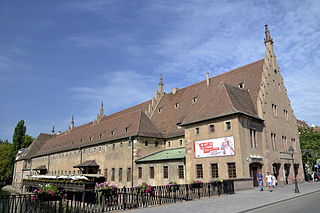
Ancienne Douane is a 14th-century building on the Grande Île, the historic city centre of Strasbourg, France. The structure is classified as a Monument historique by the French Ministry of Culture since 1948.
Sight 21: Musée Historique
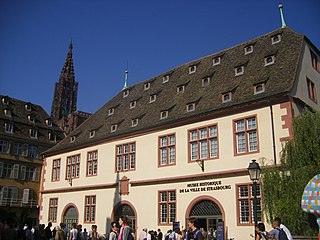
The Musée historique is a museum in Strasbourg in the Bas-Rhin department of France. It is located in the Renaissance building of the former slaughterhouse and is dedicated to the tumultuous history of the city from the early Middle Ages until the contemporary period.
Sight 22: Musée des Beaux-Arts
The Strasbourg Museum of Fine Arts is located in the Palais Rohan next to the cathedral.
Sight 23: Musée des arts décoratifs
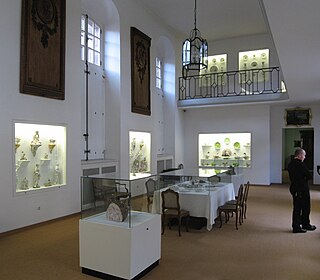
The Museum of Decorative Arts in Strasbourg is a museum dedicated to the decorative arts, located on the ground floor of the former residence of the prince-bishops of the Alsatian metropolis, the Palais Rohan.
Wikipedia: Musée des arts décoratifs de Strasbourg (FR), Website
Sight 24: Musée archéologique
The Musée archéologique of Strasbourg, France is the largest of the numerous Alsacian museums displaying regional archeological findings from Prehistory to the Merovingian dynasty. It is located in the basement of the Palais Rohan.
Sight 25: Église catholique Sainte-Madeleine
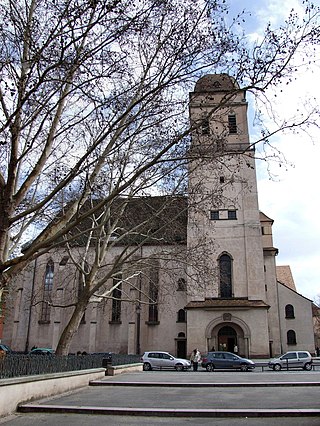
The Sainte-Madeleine Church is a Catholic church in Strasbourg, France, which was built in Gothic style in the late 15th century, but largely rebuilt in a style close to Jugendstil after a devastating fire in 1904. Destroyed again during World War II, the church was re-constructed in its modern form.
Sight 26: Cour des Couples
The Cour des Couples is a historical monument located in Strasbourg, in the French department of Bas-Rhin.
Sight 27: Musée Alsacien
The Musée alsacien is a museum in Strasbourg in the Bas-Rhin department of France. It opened on 11 May 1907, and is dedicated to all aspects of daily life in pre-industrial and early industrial Alsace. It contains over 5000 exhibits and is notable for the reconstruction of the interiors of several traditional houses. It also features a rich collection of artifacts documenting the everyday life of Alsatian Jews.
Sight 28: Chevalier Liebenzeller
The Battle of Hausbergen was a historic military engagement that took place in the Alsace region of northeastern France on 8 March 1262. The battle marked the release of the 'burghers' (citizens) of Strasbourg from episcopal authority and gave the bourgeoisie control over politics and commerce. The battle occurred on the fields of Hausbergen, an area of countryside a few miles northwest of the city of Strasbourg. It resulted in the decisive victory of the townsmen over the forces of the Bishop of Strasbourg, Walter of Geroldseck and the granting of free imperial city status by King Philip of Swabia to Strasbourg.
Sight 29: Büchmesser
The Büchmesser, "belly measurer", is a sandstone column dating from 1567 located at the corner of 11 rue Mercière and the square in front of the Notre-Dame de Strasbourg cathedral, on which rests the corbelling of the former Stag pharmacy, the oldest parts of which date back to the fifteenth century. The Büchmesser has been classified as a historical monument since 1936.
Sight 30: Musée de l'Œuvre Notre-Dame
The Musée de l'Œuvre Notre-Dame is the city of Strasbourg's museum for Upper Rhenish fine arts and decorative arts, dating from the early Middle Ages until 1681. The museum is famous for its collection of original sculptures, glass windows, architectural fragments, as well as the building plans of Strasbourg Cathedral. It has a considerable collection of works by Peter Hemmel von Andlau, Niclas Gerhaert van Leyden, Nikolaus Hagenauer, Ivo Strigel, Konrad Witz, Hans Baldung and Sebastian Stoskopff.
Sight 31: Palais Rohan
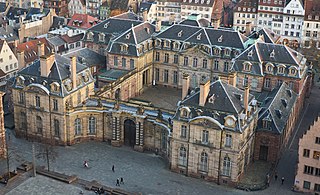
The Palais Rohan in Strasbourg is the former residence of the prince-bishops and cardinals of the House of Rohan, an ancient French noble family originally from Brittany. It is a major architectural, historical, and cultural landmark in the city. It was built next to Strasbourg Cathedral in the 1730s, from designs by Robert de Cotte, and is considered a masterpiece of French Baroque architecture. Since its completion in 1742, the palace has hosted a number of French monarchs such as Louis XV, Marie Antoinette, Napoleon and Joséphine, and Charles X.
Sight 32: Ancien Hôtel des Joham de Mundolsheim
The Hôtel des Joham de Mundolsheim is a historical monument located in Strasbourg, in the French department of Bas-Rhin.
Sight 33: Général Leclerc
Philippe François Marie Leclerc de Hauteclocque was a Free-French general during World War II. He became Marshal of France posthumously in 1952, and is known in France simply as le maréchal Leclerc or just Leclerc.
Sight 34: Opéra du Rhin
The Strasbourg Opera House, located on Place Broglie on the Grande Île in the city center of Strasbourg, in the French department of the Bas-Rhin, is the main seat and mother house of the opera company Opéra national du Rhin. It has been classified as a Monument historique since 1921.
Sight 35: Théâtre National de Strasbourg
The National Theatre of Strasbourg is a palace building on Strasbourg's Place de la République, now occupied by a theatre company of the same name, the National Theatre of Strasbourg.
Sight 36: Musée Tomi Ungerer Centre International de l'Illustration
The Tomi-Ungerer Museum – International Centre for Illustration, located in Strasbourg, brings together a large collection of drawings, archives, toys and magazines donated to his hometown by the French artist Tomi Ungerer (1931-2019).
Sight 37: Hôtel de la Préfecture
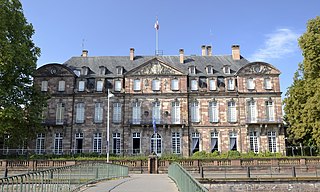
The Hôtel de Klinglin, currently known as the Hôtel du Préfet, is a historic building located near Place Broglie on the Grande Île in the city center of Strasbourg, in the French department of the Bas-Rhin. It has been classified as a Monument historique since 1970.
Sight 38: Palais épiscopal
The Episcopal Palace, formerly known as the Hôtel du grand Doyenné, is the seat of the Archdiocese of Strasbourg. A French Baroque hôtel particulier of the 1720s, it is located between Rue du Parchemin and Rue Brûlée, near Place Broglie, on Grande Île, the historic city center of Strasbourg, in the French department of the Bas-Rhin, Alsace. It has been classified as a monument historique since 1929.
Sight 39: Église Saint-Étienne
Saint Stephen's Church in Strasbourg is located inside the catholic ‘Saint-Étienne’ college in Strasbourg, for which it serves as a chapel.
Sight 40: Église Saint-Guillaume
Saint William's Church is a Gothic church presently of the Lutheran Protestant Church of Augsburg Confession of Alsace and Lorraine located in Strasbourg, France. Slightly set back from the intersection of the wharfs of the shipbuilders and the fishermen, the church is striking for its picturesque location on the bank of the Ill river, the lopsided character of its exterior, and its sumptuous interior combining the Gothic and Baroque styles.
Sight 41: Bains municipaux de Strasbourg
The Bains municipaux de Strasbourg is a municipal public bathhouse located on Boulevard de la Victoire in the Neustadt district of Strasbourg.
Sight 42: Parc Contades
The Parc du Contades is a public park in the city of Strasbourg. Located in the Neustadt, it was created in 1764 by Marshal Louis Georges Erasmus de Contades on the site of a former shooting range ("Schiessrain").
Share
How likely are you to recommend us?
Disclaimer Please be aware of your surroundings and do not enter private property. We are not liable for any damages that occur during the tours.
GPX-Download For navigation apps and GPS devices you can download the tour as a GPX file.
